|
|
|
Sort Order |
|
|
|
Items / Page
|
|
|
|
|
|
|
| Srl | Item |
| 1 |
ID:
164373
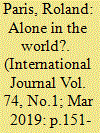

|
|
|
|
|
| Summary/Abstract |
Canada has found itself in serious diplomatic disputes over the past year with Saudi Arabia and China. The Saudis took issue with the Canadian foreign minister’s call to release human rights activists from prison, whereas China was angry at Canada’s arrest of a senior Chinese executive on an extradition request from the United States. These incidents should not be viewed as isolated aberrations. Authoritarian regimes seem increasingly emboldened to lash out at countries that displease them, including allies of the United States. But Ottawa has succeeded in rallying considerable international support for its position in the China dispute, suggesting that while Canada may be exposed, it is not destined to be alone
|
|
|
|
|
|
|
|
|
|
|
|
|
|
|
|
| 2 |
ID:
135096
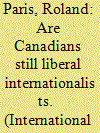

|
|
|
|
|
| Summary/Abstract |
Since coming into office in 2006, the government of Prime Minister Stephen Harper has rejected many of the symbols and practices of the liberal internationalist approach to foreign affairs that Canadian governments of all political stripes broadly embraced during the preceding six decades. As part of this change, the Harper government has also promoted a new narrative about Canada’s history and foreign policy, which encourages Canadians to change how they think about their country and its role in the world. By examining recent opinion surveys, this article asks whether Canadian public attitudes on foreign policy have shifted away from liberal internationalism and toward the Harper government's narrative since 2006.
|
|
|
|
|
|
|
|
|
|
|
|
|
|
|
|
| 3 |
ID:
159847
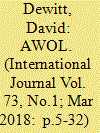

|
|
|
|
|
| Summary/Abstract |
Our focus is on Canadian defence and security activities in the Asia Pacific arena between 1990 and 2015. While governments have asserted the growing primacy of the Asia Pacific, we ask the following: What does Canada’s recent military and security record tell us about the policies and operational aspects of Canadian engagement? How might we assess these in comparison with Ottawa’s declared importance of the Asia Pacific? What might this tell us about the near-term future of Canada’s role and pursuit of interests and opportunities in this complex region? We present and analyze empirical materials drawn from primary sources that inform an assessment of Canada’s presence in the defence and security agenda of the Asia Pacific, during the period that saw Canadian governments declare a deep interest in relations with the Asia Pacific, yet fail to make Canada a full partner with sustained commitments.
|
|
|
|
|
|
|
|
|
|
|
|
|
|
|
|
| 4 |
ID:
121214
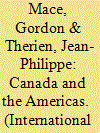

|
|
|
|
|
| Publication |
2012.
|
| Summary/Abstract |
Canada's minister of state for the Americas and consular affairs, Diane
Ablonczy, opened the December 2011 ministerial dialogue on the Americas
with the questions, "How is Canada doing in the Americas? How can we
do better?"1
The contributions to this special issue of International Journal
propose to frame some answers to these questions.
|
|
|
|
|
|
|
|
|
|
|
|
|
|
|
|
| 5 |
ID:
187384
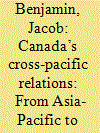

|
|
|
|
|
| Summary/Abstract |
This essay proposes a periodization of Canada’s cross-Pacific relations: from the Asia-Pacific era beginning in the 1980s to the Indo-Pacific era beginning around 2018. In the era of the Asia-Pacific, Canada was relatively disengaged on matters other than economic relations, as Ottawa sought to capitalize on dynamic emerging markets. Canada’s non-confrontational approach enabled a constructive relationship with China. The conditions for this functional relationship changed as Xi Jinping’s China assumed a more overtly revisionist, risk-taking, and confrontational foreign policy. In light of this, like-minded players in Asian security have adopted the “Indo-Pacific” nomenclature and concept in order to facilitate more interaction with each other and maintain maritime security. Midway through the Trudeau government’s tenure, the “Indo-Pacific” is likewise being adopted, as relations between China have soured while relations with other Asian partners are increasingly prioritized, notably in the security domain.
|
|
|
|
|
|
|
|
|
|
|
|
|
|
|
|
| 6 |
ID:
175148
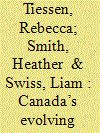

|
|
|
|
|
| Summary/Abstract |
This essay introduces a collection of articles on the lessons that can be drawn from Canada’s Feminist International Assistance Policy (FIAP) as Canada moves toward a more concrete and deliberate approach to feminist foreign policy. The articles in this collection provide insights into the challenges to be addressed, gaps to be filled, and the critical analyses necessary for expanding and enhancing Canada’s feminist foreign policy. The aim of the collection is to show that lessons learned from the FIAP can inform the design of Canada’s next steps in forging a formalized, comprehensive, and coherent feminist foreign policy. This introductory essay summarizes the five articles in this special section of International Journal on the FIAP and Canada’s feminist foreign policy and highlights their key findings.
|
|
|
|
|
|
|
|
|
|
|
|
|
|
|
|
| 7 |
ID:
175153
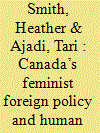

|
|
|
|
|
| Summary/Abstract |
Canadian federal governments regularly try to craft a unique image of Canada in the world; however, the Trudeau government’s embrace of feminist foreign policy feels strikingly similar to the late 1990s when human security was embraced. There seems to be a “sameness” in the promotion of a progressive values-based discourse that has transformative potential for Canadian foreign policy. The question is, does this sense of sameness bear out when we dig into the comparison? Drawing on speeches given by government ministers; policy documents, such as the Feminist International Assistance Policy (FIAP); media; and scholarship, we compare and contrast analyses of the sources of the human security and feminist foreign policy discourses and then identify common critiques. We also examine two significant differences. We find there is consistent Liberal articulation of values-based discourses and policies that have unmet transformative potential. In both cases, style and rhetoric are privileged over transformative change.
|
|
|
|
|
|
|
|
|
|
|
|
|
|
|
|
| 8 |
ID:
163127
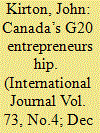

|
|
|
|
|
| Summary/Abstract |
Canada has been the successful entrepreneurial conceiver, co-creator, and normative and policy shaper of the G20 since the start. Under Paul Martin, Canada invented the concept and mission of the G20, co-creating it as a finance ministerial forum in 1999. Under Stephen Harper, Canada supported its elevation to summit in 2008, hosted it in 2010, and led important policy outcomes. Under Justin Trudeau, Canada further fostered the G20’s institutions, principles, and programs. Despite several entrepreneurial failures, Canada's lead was followed by established and rising members to make its G20 entrepreneurship succeed. Canada’s entrepreneurship was driven by its relative invulnerability to global shocks, its second-tier institutional position in the Bretton Woods institutions, and its rising relative capabilities. Canada’s three leaders brought strong domestic political control; continuity; expertise in business, economics, and finance; and mass public support. Canada was also a well-connected member of a G20 club at the hub of a global network.
|
|
|
|
|
|
|
|
|
|
|
|
|
|
|
|
| 9 |
ID:
121220
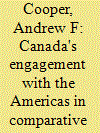

|
|
|
|
|
| Publication |
2012.
|
| Summary/Abstract |
Recent Canadian prime ministers have embraced the hemisphere of the
Americas, albeit in a differentiated and uneven fashion. Brian Mulroney
is commonly credited with "discovering" the Americas largely through
the decision to ?nally join the Organization of American States (OAS)
in 1989.1
Jean Chrétien pushed the "more amigos the better" approach
through support for the Free Trade Area of the Americas, the summit of
the Americas process, and the targeting of Team Canada activities in the region.2
|
|
|
|
|
|
|
|
|
|
|
|
|
|
|
|
| 10 |
ID:
154637
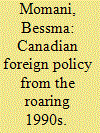

|
|
|
|
|
| Summary/Abstract |
As a field of study, Canadian Foreign Policy has undergone dramatic changes over the last three decades, becoming disconnected from debates about our identity and values and more focused on Canadian foreign and defence policy. This transition in Canadian Foreign Policy reflects the changing priorities of successive Canadian governments and structural shifts in Canadian academia. Yet, such change has unfolded gradually and incrementally, such that key challenges remain for scholars interested in working, presenting, and publishing in Canadian Foreign Policy. Using my own experiences as a student and teacher of foreign policy in Canada, I reflect on these transformations within Canadian Foreign Policy and their implications, beginning with the “golden age” of Canadian Foreign Policy during the 1990s to its decline under the Harper government and, finally, to our current climate of fragmented academic and professional research. In the current climate, participating in traditional and “new” social media places professional incentives (namely, tenure and promotion via peer-reviewed outlets) in tension with emerging opportunities to engage in more open critical analysis of Canadian Foreign Policy.
|
|
|
|
|
|
|
|
|
|
|
|
|
|
|
|
| 11 |
ID:
185227
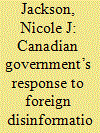

|
|
|
|
|
| Summary/Abstract |
In recent years, governments have considered how to respond to “disinformation.” However, there is little academic literature on Canada’s response in the area of security and foreign policy. This paper addresses this gap by analyzing how and why Canadian government foreign and security actors have “securitized” foreign disinformation. It argues that, since 2014, they have increased awareness about disinformation and transformed it into a matter of “security” through rhetoric and discursive framing, as well as stated policy intentions and actions. This has occurred in response to perceived threats, but without coherent policy. The findings suggest that challenges are linked to persistent difficulties in defining and understanding disinformation. The result has been fragmented actions, some of which may legitimate actions that deviate from “normal political processes.” The implications are that definitional challenges need to be addressed, the role of security actors assessed, and a clearly articulated and holistic strategy drawn.
|
|
|
|
|
|
|
|
|
|
|
|
|
|
|
|
| 12 |
ID:
154643
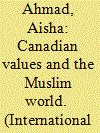

|
|
|
|
|
| Summary/Abstract |
The Canadian Charter of Rights and Freedoms constitutes the fundamental value system of our nation. The rise of anti-Muslim extremism thus presents a direct challenge to the core principles that define our liberal democracy. As our international order transforms, power polarities shift, and illiberal ideas spread across North America and Western Europe, maintaining commitment to these core Canadian values will become increasingly difficult. If our chief allies enact policies against their minority Muslim populations in the name of security, Canada will be put under pressure to do the same here at home, with devastating consequences for our democracy. Moreover, how Canada responds to the complex and multilayered crises that have gripped many parts of the modern Muslim world will have grave implications for both domestic and international security. Ideologically-motivated slogans do nothing to keep Canadians safe. It is therefore crucial that Canada continues to reject illiberal extremism and champions evidence-based international security policies, with a heavy investment in detailed ground-level analysis of these complex conflict theatres.
|
|
|
|
|
|
|
|
|
|
|
|
|
|
|
|
| 13 |
ID:
178191


|
|
|
|
|
| Summary/Abstract |
Three colleagues pay tribute to Greg Donaghy, who at the time of his death on 1 July 2020 was the co-editor of International Journal and Director of the Bill Graham Centre for Contemporary International History at the University of Toronto. Dr Donaghy’s imaginative international history expanded the canvas of Canadian foreign policy beyond the traditional limits of the North Atlantic Triangle. As an author, editor, and mentor, he redefined the way that Canada’s world looks to its scholars.
|
|
|
|
|
|
|
|
|
|
|
|
|
|
|
|
| 14 |
ID:
135208
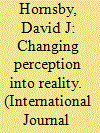

|
|
|
|
|
| Summary/Abstract |
Canadians tend to perceive Canada’s historic engagement and influence in Africa in ways very much disconnected from reality. Canada’s self-image as a humane internationalist country deeply engaged with Africa relies on an idealized version of history. Nevertheless, there have been times when the reality of Canadian foreign policy engagement with Africa has been much closer to that ideal than it is now. This paper seeks to contribute to the debate on Canada–Africa relations by building greater understanding of Canada’s position in Africa. It tackles the question of Canada’s engagement with Africa by analyzing three broad aspects of a possible relationship between a developed country and developing region: the economic, developmental, and trans-societal. Analysis of these three areas of interaction provides insight into what could be done to renew or reinvigorate Canada’s engagement with Africa.
|
|
|
|
|
|
|
|
|
|
|
|
|
|
|
|
| 15 |
ID:
140325
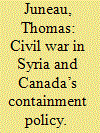

|
|
|
|
|
| Summary/Abstract |
The civil war in Syria has caused the deaths of more than 230,000 civilians and combatants, has led to one of the largest refugee crises in recent memory, and has destabilized the Levant. It therefore represents an extraordinarily challenging foreign policy conundrum. A wide variety of responses—ranging from the imposition of no-fly zones to doing nothing—have been considered in Ottawa and in allied capitals since 2011. Each one, however, raises potentially significant challenges.
This article explores how Canada has considered those alternatives. As is systematically the case for a non-great power, Canada’s policy options were shaped more by deliberations in allied capitals—especially Washington—and only thereafter by actual developments in Syria. After laying out Canada’s interests relative to the war in Syria, the article describes four policy alternatives that Canada has faced since 2011, as seen through the lenses of liberal pacifism, liberal interventionism, isolationism, and containment. Among this menu of deeply flawed options, containment has steadily emerged as Canada’s de facto approach. That approach has been correct: it is the least bad course of action available since it best allows Ottawa to protect and promote its interests. Nevertheless, Canada could take additional steps to implement a more comprehensive containment framework.
|
|
|
|
|
|
|
|
|
|
|
|
|
|
|
|
| 16 |
ID:
106507
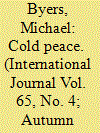

|
|
|
| 17 |
ID:
154635
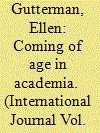

|
|
|
|
|
| Summary/Abstract |
Taking the view of International Relations (IR) as a socio-intellectual space conditioned by historical circumstances, and drawing on my personal reflections on international politics in the 1990s as a particularly important influence on my own professional and intellectual path in IR, this paper explores the 1990s as an exceptional period that shaped the decline of Canadian Foreign Policy as a field of study in Canadian IR. Bookended by the collapse of the Soviet Union and the end of the Cold War, at the beginning, and the start of the War on Terror at its finale, the 1990s can be read as an “optimistic interregnum” during which new possibilities arose for an inclusive, global transnationalism and the global governance of important problems. New ideas and new ways of conceptualizing IR through a global lens emerged. For Canadian students of IR in the 1990s, outward-looking globalism, transnationalism, cosmopolitanism, and theoretical eclecticism fit with the hopeful optimism of the times. In contrast, CFP—with its attendant requisite of policy relevance in service of Canadian national priorities—seemed inward-looking, parochial, and on the sidelines of important new intellectual currents and analyses.
|
|
|
|
|
|
|
|
|
|
|
|
|
|
|
|
| 18 |
ID:
129554
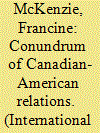

|
|
|
|
|
| Publication |
2014.
|
| Summary/Abstract |
Forty years ago, political scientist Denis Stairs published The Diplomacy of Constraint, an account of Canadian involvement in the Korean War. Stairs explored the attempts of Canadian politicians, diplomats, and bureaucrats to constrain US intervention in Korea and, more generally, to influence the conduct of its foreign policy in the pressurized context of the early Cold War. Since then, historians and political scientists have continued to publish accounts of Canadian involvement in the Korean War and books on Canada-US relations in general. Why, then, should someone read The Diplomacy of Constraint today when there are more recent analyses? This review essay attempts to explain the longevity and usefulness of Stairs' study. What have scholars learned from Stairs' interpretation and approach? Has he influenced subsequent academic analyses? Can his study be considered a model of interdisciplinary scholarship? Finally, is new scholarship intrinsically better than old?
|
|
|
|
|
|
|
|
|
|
|
|
|
|
|
|
| 19 |
ID:
135100


|
|
|
|
|
| Summary/Abstract |
Canada’s non-acquisition of nuclear weapons in the immediate postwar period represents an important puzzle. Acquisition of an independent nuclear arsenal presented Canada with an unprecedented opportunity to ameliorate its objective insecurity vis-à-vis US power. Many theories suggest that when combined with Canada’s postwar capabilities, this insecurity ought to have pushed Canada toward acquisition. I argue that Canada’s non-acquisition of nuclear weapons can only be accounted for by an explanation that recognizes the importance of trust. To do so, I develop a conceptual framework for understanding trust in international politics. Drawing on research from psychology, economics, and even neurology, I develop a model that shows how narratives like liberalism can render trusting behaviour reasonable for agents, and how five mechanisms can generate the conditions required for trust to obtain. By applying this model to the Canada–US relationship I provide an explanation for Canada’s non-acquisition that is superior to existing accounts.
|
|
|
|
|
|
|
|
|
|
|
|
|
|
|
|
| 20 |
ID:
157677
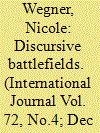

|
|
|
|
|
| Summary/Abstract |
Winning hearts and minds in counterinsurgency missions is not only a strategy to be used on foreign populations, but also one that is necessary on the “home front.” This article is focused on the home battlefield; it is an analysis of the efforts by Canadian political elites to justify the use of military resources during the 2001–2011 interventions in Afghanistan. To fully understand Canadian public opinion of the Afghanistan war requires assessing domestic discursive “battlefields.” This article examines domestic debates as a key “battleground” in the war to win public consent for Afghanistan. I argue that the absence of active resistance to military involvement in the Afghan mission can best be explained by examining discourse about Support(ing) the Troops, the effect of which was to censure anti-war voices. In short, despite public discontent about the war, Support the Troops discourse was manoeuvred in a way that stigmatized anti-war narratives. This article considers how the rhetoric of Support the Troops movements in Canada played a role in normalizing militarization, and how this discourse was manoeuvred to legitimize military activities in Afghanistan.
|
|
|
|
|
|
|
|
|
|
|
|
|
|
|
|
|
|
|
|
|